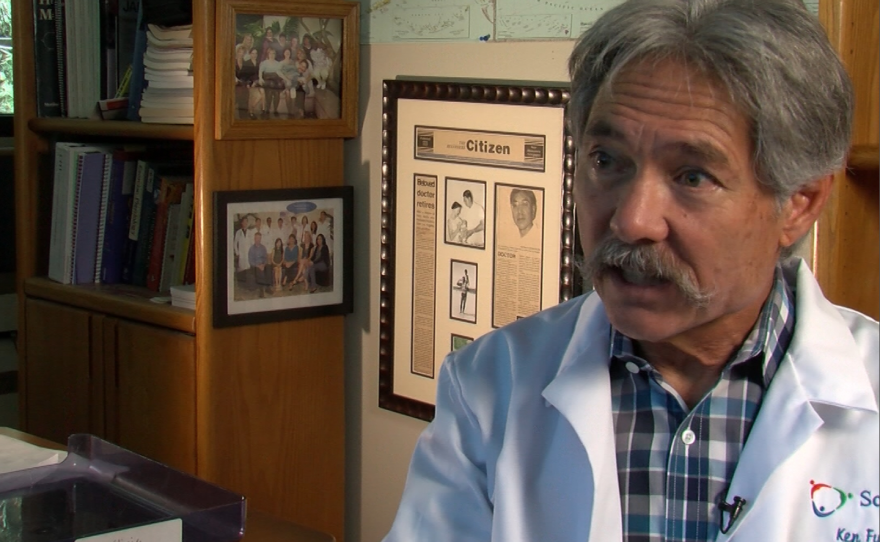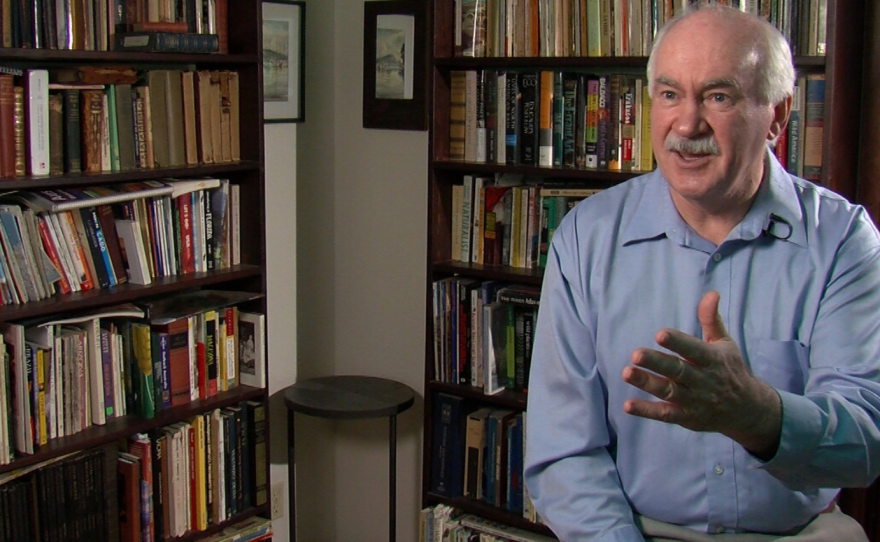Ronald Ward lives in what he calls the “prettiest house on the block,” located in Southeast San Diego's Valencia Park. While sitting in his backyard, he described his addiction to cigarettes during the breaks between airplane flights that thunder overhead.
Ward said he became a two-to-three pack a day smoker after he started smoking in the army, and his habit lasted for decades. He tried to quit at least once. But the idea did not stick until his doctor found he had a respiratory problem called Chronic Obstructive Pulmonary Disease, or COPD.
“And my doctor said, ‘Ward, you smoke?’ I said, 'yes, I do. I enjoy it.' ‘Well you gonna have to un-enjoy it. You need to quit or eventually it will harm you, and you could die.’ He got my attention,” said Ward.
Ward's journey to being a non-smoker had its setbacks. One thing he did not anticipate was weight gain. Once he gave up cigarettes, he added 30 pounds to his 5-foot 6-inch frame, shooting up to 195 pounds.
“When I stopped smoking, I started eating more. Your taste buds … you gain all of your senses, especially the taste buds. And man, everything tastes better!” he said.
Quit Smoking – Gained Weight. Three San Diego stories.
“So I had my battle (with smoking). And once I got off I gained 30 pounds, man. I shot up on 195, and I felt like I did previous (when I tried to quit) in Illinois. I was obese. I had a gut. I couldn’t even bend over to tie my shoes.” — Ronald Ward
“I'm positive quitting smoking attributed to my weight gain in two ways. Smoking accelerates metabolism, so when I quit my metabolism majorly slowed down.... Also, I substituted alcohol for smoking.” — Cathy Caraco
"(After quitting cigarettes) I gained over 20 pounds in one year. I had this great strategy to eat licorice instead of smoking. I would hold it like a smoke, flick the 'ashes' like a smoke... I ended up eating close to two packs of Twizzlers a day."— Jim Van Matre
It is a common story. In fact, you can say it is a symbol of the way America’s smoking problem has been replaced by an obesity problem.
In 1955, nearly 57 percent of all men smoked — nearly twice as high as for women, according to the Centers for Disease Control and Prevention. By 2015, it dropped to 16 percent of men and 13 percent of women smoking. At 11 percent, California today has the second-lowest adult smoking rate in the country. Only Utah is lower.
Meanwhile, 36 percent of Americans are obese, up from 13 percent in 1962. That does not include people who are merely overweight. So why is one going down while the other is going up? Is there a connection?

What We Know About Smoking And Overeating
Dr. Ken Fujioka is director of the Center for Weight Management for San Diego’s Scripps Clinic. He has seen a lot of patients gain weight after they stop smoking.
“When you stop smoking cigarettes, two things happen,” Fujioka said. “One is that most people eat about 225 calories more a day. But the other thing they do is they actually burn less calories when they come off of cigarettes. So they burn 15 percent less, which is very significant.”
Tobacco’s effect of increasing body metabolism is well documented. Tobacco’s reputation as an appetite suppressant is also well known. One study published in the journal Science found that receptors in nicotine activate neurons, which reduce food intake and body weight. The tendency to lose weight has long been a part of cigarette marketing, maybe most obvious when it came to cigarettes targeting women, like Virginia Slims.
All of this makes anti-smoking advocates nervous, since the message seems to be if you want to lose weight, smoking will help you do it.
But smoking, with its links to cancer, heart disease and emphysema, is still seen as the leading preventable cause of death.
“If I had 20 people who smoked cigarettes and 20 people who were overweight, I would say no, we need to worry about the people who smoke,” Fujioka said.

“The problem is we have so many more people — it’s hard to find people who smoke in San Diego — but if you look at how many people are overweight in San Diego, we’re just the same as the rest of the U.S. We have a lot.”
Health problems that come with obesity include diabetes and sleep apnea, and the now the challenge is finding a way to bring them under control.
Can We Attack Obesity Like We Did Smoking?
John Pierce lives in a large house on Mt. Helix in La Mesa. A professor emeritus of behavioral epidemiology at UC San Diego, he spent years working with Moores Cancer Center. He may be best known for his battles with the tobacco industry over their child-friendly marketing cartoon character Joe Camel.
Pierce calls the reduction in smoking rates probably “the biggest success story of public health.” He said he sees plenty of parallels between obesity and the declining problem of smoking.
“The decline has not been so much on smoking cessation. It’s very difficult for people to quit. It’s been a major decline on who starts taking it up,” said Pierce. “Now what we’re seeing in obesity is the same thing. It’s kids getting to (age) 18 already obese.”

Just as Pierce took on the tobacco industry, he said the next step in the fight against obesity is to take on the food industry. He said people do have to eat but they don’t have to eat sugar-sweetened drinks and cereals. He said the struggle with obesity has a lot to learn from the struggle with cigarette addiction.
“There’s a playbook on how to do it now,” he said. “But we need political will. And we need to empower our public health groups to actually run a program to focus on healthy behaviors across the board.”
Ken Fujioka adds that when it comes to obesity, society has identified some culprits.
“We know for children and their becoming overweight, the biggest culprit is sodas. So we can go after those, and it’s actually working. So as you know, several years ago, we got sodas out of schools,” he said. “Guess what? Kids don’t gain weight when they’re in school. They gain weight in the summertime.”
Former smoker Ronald Ward said he lost about 15 of the 30 pounds he gained when he quit smoking, although he said some of those pounds do come back during the holidays.
Despite his struggle with weight, he said he is very happy to no longer be what he calls a “compulsive, heavy smoker.”
“I feel healthier. I can breathe. Everything tastes better. Even water!” he said with a laugh. “It’s funny when you don’t realize the simple things of life that you miss.”






